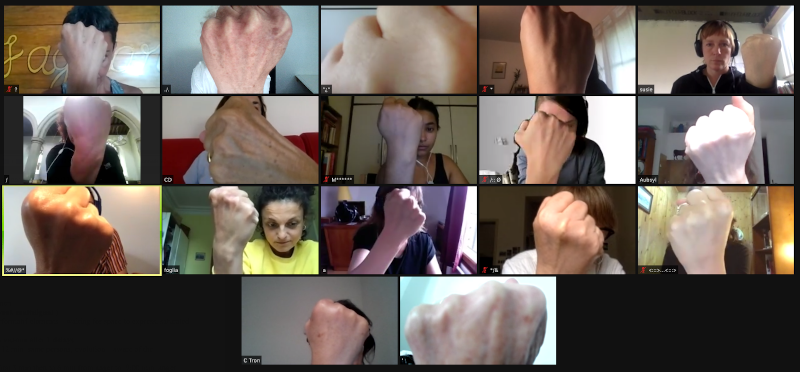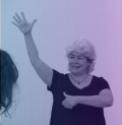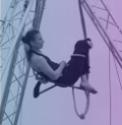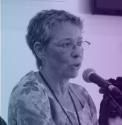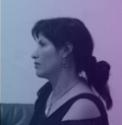An Experience of Angry Women
I wasn’t sure about signing up for Annie Abrahams’ Angry Women workshop and performance. Lately, anger isn’t really a thing for me. Sometimes I miss it. Sometimes I wonder to myself, “Where has that kick-ass, punk-angry rebelliousness gone?”
Sometimes I fear I have become that oblivious, internally combusting middle-aged woman I used to despise and pity in equal measure. Sometimes, I wonder if a silent, unbidden anger is slowly but surely imploding within, destroying every last bit of me in the process, leaving only the shell of me intact. Perhaps I signed up for Angry Women as an excuse to check on the state of my anger, to see if it was still there -- an island in calm waters hard to reach, or a force of destruction hard to detect?
The day of the rehearsal I was nervous. I rarely perform these days, preferring directing and dramaturgy to being in front of an audience. The performer in me, like the anger, is something that got lost in the flotsam and jetsam of living an adult life. Sometimes I daydream that when I turn 60, that punky, cocky younger self will re-emerge, and I will jump back on stage with the ease of the woman I was in my 20s. I’ll perform crazy, experimental pieces and say all the things I’ve been too polite to say over the years – In other words, I’ll be like the women in Magdalena, who dare and dare, no matter the circumstances, no matter what the world might say about women in theatre, women of any age daring to create what they want to create.
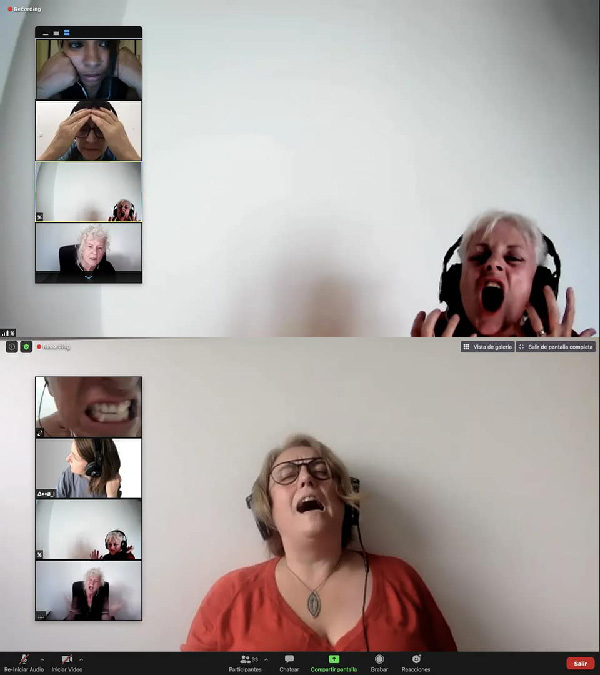 This brings me to another reason I wanted to be involved in this festival: I wanted to see what could be done with theatre online. What could be done by women, many of them of a certain age, non-digital natives, who were daring to say, “We will not be silenced by these circumstances, we will find a way to keep putting our work out there. Our work is important and deserves this attention.” Of course, many of the women in Magdalena had already been working online and digitally before CORONA, and that was important too. What could I learn from these pioneers?
This brings me to another reason I wanted to be involved in this festival: I wanted to see what could be done with theatre online. What could be done by women, many of them of a certain age, non-digital natives, who were daring to say, “We will not be silenced by these circumstances, we will find a way to keep putting our work out there. Our work is important and deserves this attention.” Of course, many of the women in Magdalena had already been working online and digitally before CORONA, and that was important too. What could I learn from these pioneers?
But back to the rehearsal. We did not introduce ourselves, and once Annie had done a bit of housekeeping, she asked us to change the setting that displayed our names to symbols. “Have people in the past called each other out? Started to argue?” I wondered. “Is this a way to make the anger less personal?” I clicked on the setting and typed in three dots: an ellipsis, that ambiguous piece of punctuation that perhaps expressed my doubts about how well-suited I was to the performance, or perhaps my doubts, period. Other people put little, old-fashioned emojiis, others asterisks. No one, I noticed, put a line of punctuation that would suggest bleeped out swear words in a text. Too obvious? Cliched? Forbidden? Was replacing our names a performative act in this piece?
Annie outlined the three key elements that would frame our work. She said we should be present, that we should trust, and that we should listen. I wondered about the trust. We weren’t in the same room with each other. We couldn’t see each other’s bodies to read body language. We didn’t even know each other’s names. Conversely, we could see into each other’s houses, an unusual intimacy amongst strangers, and read the language (however limited) of the objects within each frame. We could see each other’s faces, and perhaps read them more closely than usual because our gaze could be read only as to the camera, allowing us to look at each other in a way usually reserved for those we know and trust. I decided to trust the process, and Annie, and the other women in the rehearsal. There was no point in being here if I wasn’t willing to do the work.
Before beginning the first rehearsal, Annie asked us to consider a few phrases that we might introduce into the piece, and gave us a few minutes to write. The phrases that came to my mind were about my missing anger. Where had it gone? It used to be so strong. Was it a bad thing to have lost?
When we came back, Annie instructed us to keep our cameras on, close our eyes, wait ten seconds, and then begin. The overriding sensation, upon opening my eyes, was not visual but aural. A polyphony of voices in different languages and timbres washed over me. I felt caught up in the riptide of it, searching for the way up through the sound to air, air for breath, air for voice.
Some voices were already up there, cutting straight through the polyphony – A youth, a boy of only 12, had been gunned down in the street – “Bang! Bang!” came the refrain. Someone else ate her tongue, ate her words. Someone else’s words had been stolen. “I’m scared”, said someone. “Don’t be scared,“ came the reply. “There are some people whom I will never forgive, “ said a woman. She had a list. I thought of my Buddhist teacher, who had asked the class, “When you carry anger around, who does it really hurt?” I floated a version of the question into the waters: “What does being angry solve?” The response was quick: “Is that what we’re trying to do here? Solve things?” Annie pushed her fist towards the camera rhythmically, provocatively. A call to arms? A taunt? A dare? The gesture seemed somehow more powerful than so many words – I thought of Yoko Ono’s song Revelations and the lyric, “Bless you for your anger/It’s a sign of rising energy.” Was our energy rising? Were we feeling anger? Commenting on it? Performing it? With so many thoughts in my head, I had broken my agreement with Annie to be fully present, and was somewhat relieved when she ended the session for a quick debrief.
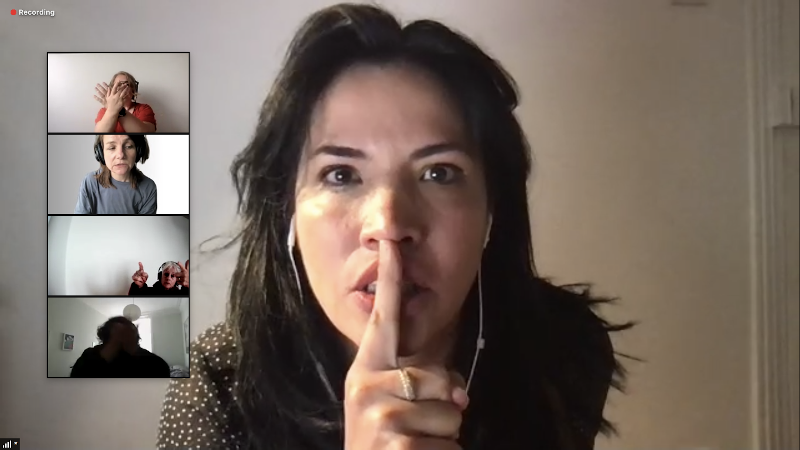 After discussing what we thought had worked and what hadn’t, we tried a second version. This time Annie asked us to turn off our cameras and only appear with an intention. I determined to be more present this time round and with the added element of virtually stepping into and out of the performance space, I found it easier to navigate my way through the words, gestures and facial expressions that were generated. I abandoned my original phrases and improvised, responding to my fellow performance partners and offering what came to me naturally, without filters or cops in the head. Having the option to be silent and unseen created more freedom for me, it gave me a little space for personal dramaturgy, to find my place within the structure and get out of the way when I felt like I had nothing to offer. Annie also seemed to prefer the second version, but decided we would do both versions: one version on Friday, and the other on Saturday. I was pleased when she decided the version I preferred would be done on the evening I was performing.
After discussing what we thought had worked and what hadn’t, we tried a second version. This time Annie asked us to turn off our cameras and only appear with an intention. I determined to be more present this time round and with the added element of virtually stepping into and out of the performance space, I found it easier to navigate my way through the words, gestures and facial expressions that were generated. I abandoned my original phrases and improvised, responding to my fellow performance partners and offering what came to me naturally, without filters or cops in the head. Having the option to be silent and unseen created more freedom for me, it gave me a little space for personal dramaturgy, to find my place within the structure and get out of the way when I felt like I had nothing to offer. Annie also seemed to prefer the second version, but decided we would do both versions: one version on Friday, and the other on Saturday. I was pleased when she decided the version I preferred would be done on the evening I was performing.
In the days between the rehearsal and the performance, my awareness of what I had signed up for sat lightly under everything I did. A friend suggested I invite my mother to the performance. I considered it, but decided against it. Even though my mother hasn’t watched me perform for many years, I knew that I could not participate unselfconsciously if I knew she were watching. I started to think about what women are taught about anger and its display, and the judgements passed on angry women, the names they are called when they are angry, the names they are called out of anger: “Bitch, salope, puta” – and, more recently, somewhat implausibly, “Karen” -- “Karen”, that angry, risible, know-it-all Youtube woman-of-a certain age (my age). “Oh how angry women are wrangled, one way or another, “I thought to myself. Suddenly a phrase came to my mind, “If you don’t have anything nice to say…” And there it was again, the ellipsis, this time truncating the phrase because the ending was known, the threat implied, internalized, my feelings about it ambiguous, maybe even angry? I decided I would use these names and this phrase for the performance on Saturday night.
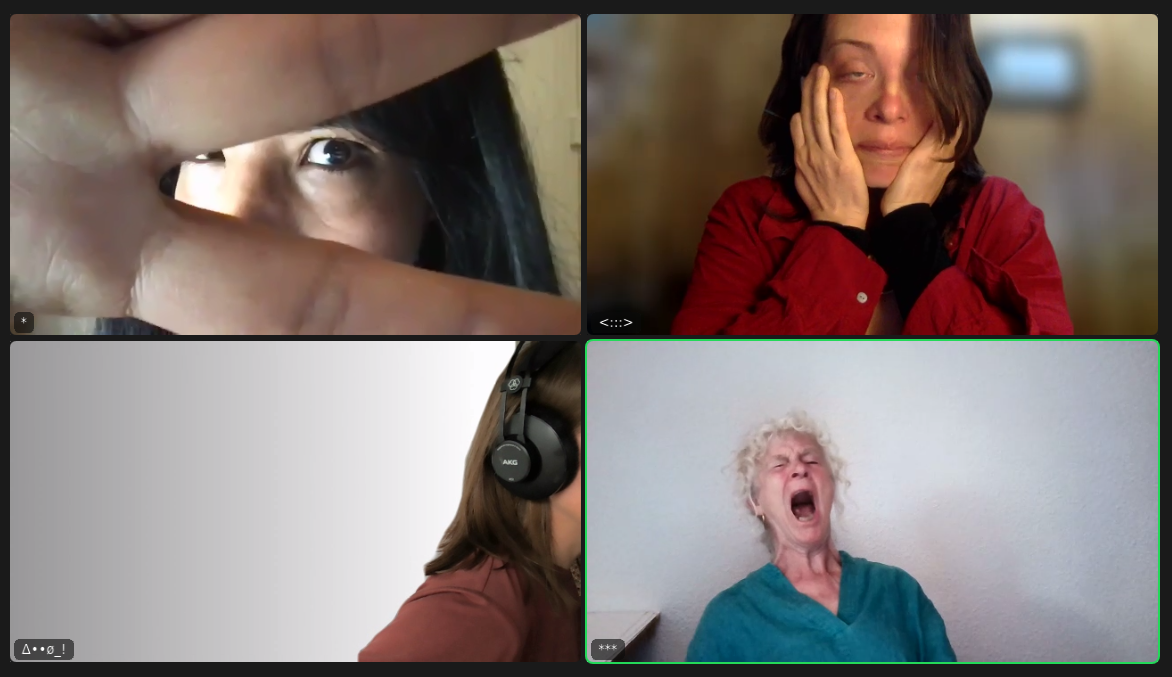 I was slightly less nervous on Saturday than I had been for the rehearsal. I felt better about the words I would start with and had experimented a little with moving within the frame of my camera as well as moving the frame itself by picking up my computer. I felt I had more online performance movement possibilities, and could place gestures and frame my face in different ways to combat my tendency towards being static in front of the computer. When we began the performance, I recited my, “Bitch, salope, puta, Karen” incantation quietly, using only my voice and not my image. When I heard Annie say, “Respect me”, I felt an impulse to stop my incantation, and did. The network between us felt so delicate, the line between exploring anger and becoming angry shimmering as a possibility that scared me a little. In fact, words scared me, still somehow hard to navigate in the polyphony, so I turned to gestures, responding to proposals, creating some myself. At a certain point, very organically, a space seemed to open for my, “If you don’t have anything nice to say…” I played with the completion of the phrase, disconnecting “Don’t” from “say it”, so that they could be separate commands, or the ending of “If you don’t…” It seemed to provoke responses, so I stayed with it for a while, experimenting with tempo, gesture, tone. I was enjoying working with the other women in the performance, and felt connected to them. I felt less connected, however, to the audience. Was that important in an online environment? I wasn’t sure.
I was slightly less nervous on Saturday than I had been for the rehearsal. I felt better about the words I would start with and had experimented a little with moving within the frame of my camera as well as moving the frame itself by picking up my computer. I felt I had more online performance movement possibilities, and could place gestures and frame my face in different ways to combat my tendency towards being static in front of the computer. When we began the performance, I recited my, “Bitch, salope, puta, Karen” incantation quietly, using only my voice and not my image. When I heard Annie say, “Respect me”, I felt an impulse to stop my incantation, and did. The network between us felt so delicate, the line between exploring anger and becoming angry shimmering as a possibility that scared me a little. In fact, words scared me, still somehow hard to navigate in the polyphony, so I turned to gestures, responding to proposals, creating some myself. At a certain point, very organically, a space seemed to open for my, “If you don’t have anything nice to say…” I played with the completion of the phrase, disconnecting “Don’t” from “say it”, so that they could be separate commands, or the ending of “If you don’t…” It seemed to provoke responses, so I stayed with it for a while, experimenting with tempo, gesture, tone. I was enjoying working with the other women in the performance, and felt connected to them. I felt less connected, however, to the audience. Was that important in an online environment? I wasn’t sure.
The next day I asked two people who had watched the performance what they thought about it. One enjoyed it, but thought that perhaps we were a bit too static behind our computers. The other said she, “didn’t feel smart enough to understand it.” I probed further. “Did it make you think anything? Or feel anything?” I asked. My friend replied, “Well, I didn’t want to switch it off, and it made me think about anger. I felt uncomfortable watching it, but I wanted to keep watching.” I liked this response. It’s the kind of response I like to provoke through my own work. Kind of like sticking a sliver under the audience’s skin, giving them something to worry at for some time to come.
Thinking about this made me start to think about my own work again. Perhaps that project languishing in scattered notes, photographs, ramblings and computer lists could be knocked into something workable, online or off. Maybe I could even perform in it myself. Why not? The possibilities are there. I suddenly started to catch a glimpse of that punky, swaggering, blaguing 20 ,30, 40 -something woman I was, have been, still am. That woman who dares is still in me somewhere. Writing this, I realize that attending the Magdalena Festival and working with Annie have reminded me of this.
Performing in Angry Women doesn’t/didn’t solve anything, and that, as one of my co-performers pointed out, wasn’t really the point. It has changed something though, at least for me.
Shelly Quick
